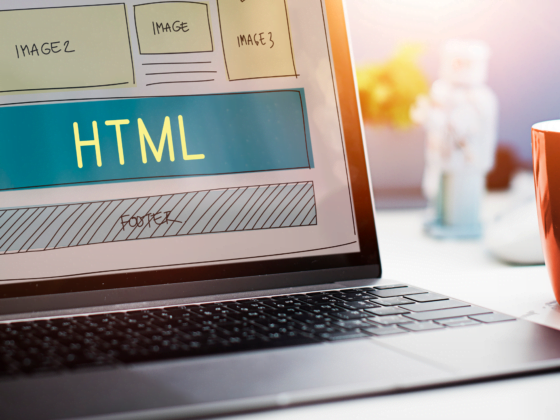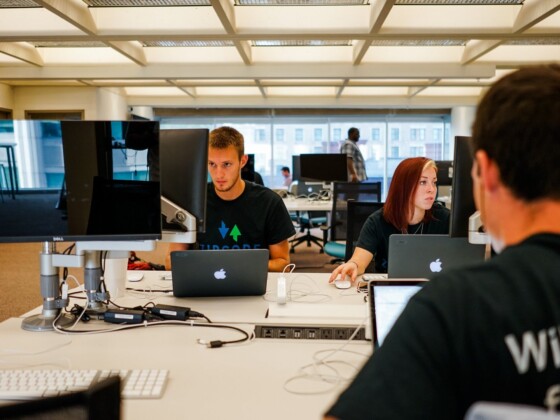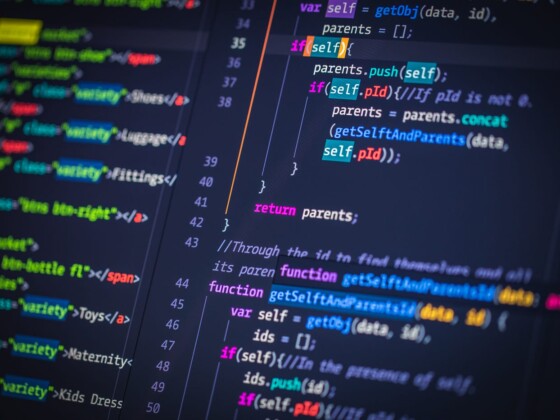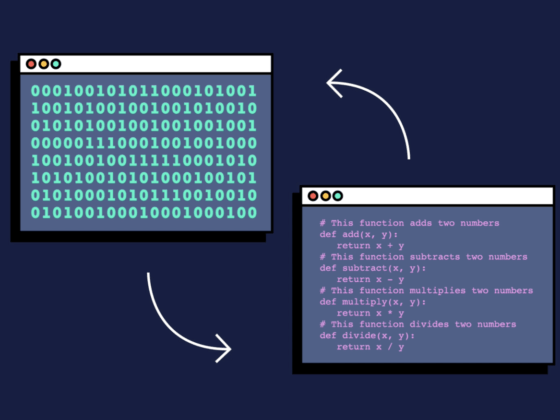Many people want to change their careers, but this is an important decision that requires careful consideration beforehand. Programming remains one of the most popular areas for a career change, but you still need to think meticulously about your choice before taking action. Here is advice on starting your reeducation for a programming career.
5 easy coding languages for a beginner
Before starting to learn programming, a beginner should choose a language on which they are going to focus during their studies. Although most programmers need to understand code in several languages, picking a basic programming language is a good way to start your career. Later, you can expand your knowledge and learn new frameworks or languages as needed for a specific job.
C
C is a basic yet complex programming language, and it is a suitable start for a person who wants to become a developer. C is a “machine-oriented” language that allows manipulating data using machine logic. Thus, it is suitable for creating programming environments for multiple purposes. However, its syntax is less “human-like” than that used in other languages, so it is less of an easy programming language for beginners. Another benefit of the C language is learning more than one language at once. C++ and C# are related to C by structure and syntax, and you will be able to understand code in the other two languages if you know the original one. Besides, its long history and popularity have contributed to the abundance of courses and textbooks available that you can use to learn C with an instructor or by yourself. Hence, C is not the easiest language to start learning, but you will probably benefit from knowing it in the future.
Python
Python is another popular language, as it is well known for its applicability to different programming tasks. Python is suitable for writing programs and user interfaces, web development, data analysis, and statistical calculations. Some Python libraries are popular even among scientists and geneticists who analyze biological data. In addition, Python is easier to read compared to other programming languages. It has clear and organized syntax, and most of its constructions resemble the common English language. It is a basic computer language for beginners, as you can use it to understand the general logic of programming without the need to pay attention to every tiny semicolon that could ruin your code in more demanding languages. Still, Python requires precise optimization to reach maximum efficiency, and it is less suitable for the development of mobile applications. Python is the language to learn coding for absolute beginners, but it allows the potential for growth and specialization in multiple areas.
Java
Java is another “complex language for every purpose,” although it has little external similarity with C, which is a basic coding language. However, they share the same ideas, and the tools of these languages allow you to create digital ecosystems with effective information exchange. Java is a cross-platform language, and that means that you can run Java code on every compatible platform or operating system. A Java developer can create programs for a PC or specialize in mobile apps. Another area of Java application is web development, although it is less popular there than Python or JavaScript. Still, Java will require significant effort to master, as while it allows precise manipulation with machine commands, its syntax aims to be understandable for machines, so Java coding for beginners may be a tricky task. However, there is a high demand for Java developers on the market, so you can look at it if you want to find a job after the programming courses.
JavaScript
No, JavaScript is not similar to Java. It is one of the first questions students might ask when they hear about these two languages during basic coding classes. To be clear, Java and JavaScript are not related, and they were developed by different companies. They share the same programming approach and coding basics, as both are object-oriented, and they have some similar syntactic rules. However, object-oriented programming is a common paradigm shared by most popular programming languages. JavaScript is necessary to learn web development basics for beginners. Its purpose is to establish interaction between interface elements, server information, and user actions. Knowledge of CSS and HTML is necessary for effective JavaScript programming. Another area of its application is automatic testing, as JavaScript is a language of several testing frameworks. However, web development is an area with high demand for new specialists, and it is worth starting to learn it.
Ruby
Ruby is another language with clear syntax and a well-organized structure, and it is almost as popular among people who want to learn computer programming basics for beginners as Python. It does not use complex programming vocabulary or commands that consist of several letters that are easy to understand for a computer but not for a human. Another benefit of Ruby is the availability of the Ruby on Rails framework that allows convenient work with web development projects. Moreover, there are plenty of libraries available for Ruby, and you can use these libraries to find pre-written functions necessary for your project. However, Ruby requires precise optimization to work efficiently. It is an “easy to learn, hard to master” language. You need to scale it to the size of your project or web application after learning Ruby programming basics so that it does not consume too much of the user’s computer resources. Still, if you want to pick a clear language with an abundance of libraries and additional options for improving your coding, Ruby is a suitable choice.
How to choose a coding language that suits you
Choosing a programming language is an essential step in changing your career and starting to learn computer programming basics for beginners. However, it will help if you base your choice on the programming area in which you want to specialize. There are universal languages to learn basic programming, such as C or Python. Still, they have their limitations, as Python is not very suitable for mobile applications, while C is hard to adjust for web development. Besides, if you want to practice using them beyond learning easy coding for beginners, you will need to focus on one specific aspect and continue learning by developing your skills and adding new stones to build your knowledge. Specifically, if you want to become a web developer, JavaScript is almost necessary, and Ruby is a good addition for this purpose. If you want to develop complex programming environments, choose C and Java, but be prepared to spare no effort in learning them. Python is a beginner-friendly language suitable for data analysis and user interface creation.
Basic IT courses and what to choose
As soon as you choose the language, you need to pick specific basic coding classes. Most basic programming courses teach their students one language, and you will not need to switch between several of them before you complete your first projects. However, courses often mention various specializations that can create an outline for your future career.
Web-development
Web development is about creating sites, from simple landing pages to complex portals for thousands of users. It includes creating site interfaces and configuring them for effective interactions with the clients. Web developers need to plan a logical map for a future site or web application, code its functions, and establish interaction between a site user and a server. Good analytical thinking is another helpful thing for a web developer to have, along with programming skills. Although clients often define the creative concepts for future projects, a developer should be able to turn those concepts into live sites. The most common programming language used in this area is JavaScript. However, you may need to understand PHP or Ruby, or learn programming for beginners in a way that focuses on other server-side languages. Specialization in web development is suitable for people who want to use their programming knowledge to solve new tasks for each project.
Data Science
Although it may sound strange, data science is closer to solving practical problems than manipulating theoretical concepts and global models in a more profound and abstract manner. Obviously, you can apply your knowledge to this area as well, but most people choose data science for solving less world-changing problems and when coding programs for beginners. Data science analyzes information about an application’s performance and finds ways to optimize it. For example, a data scientist might run tests to choose the more suitable interface from among two or more options. Moreover, it can use this data to analyze user behavior and identify existing problems in an application or program. Most data science tests use various types of statistics, and the manipulation of statistical data is most convenient with Python, which has several built-in libraries for this purpose. Data science requires analytical thinking and a basic knowledge of mathematics, but it has flexible limits of applicability so that you can learn new skills throughout your career.
Front end
The front end is an area of programming that focuses on creating websites and user interfaces using HTML and CSS languages for programming websites for beginners. It requires an understanding of design principles and coding abilities. The general scheme of a future site is usually available in the project brief, but the optimization of this scheme is one of the key tasks of a front-end developer. Nowadays, people can open sites on different devices, including laptops, PC, mobile phones, and even smart TVs. However, a site needs to look aesthetically pleasing and be convenient to use on any of these devices. Front-end developers create multiple options for different modes of site viewing and code future web pages. The same applies to the mobile application interface, as additional options may be necessary depending on the size of the phone screen and the resources of its processor. Front-end development is an area for programmers who want to use their creativity to create a good design while coding.
QA
QA stands for “quality assurance,” and those in this specialization are responsible for ensuring the correct operation of applications and programs. Quality assurance specialists should look for bugs, errors, and other problems concerning the proper execution of program functions. The primary responsibility of a QA engineer is to report these issues to the developers so that they can fix the bugs. However, this job is not as easy as simply writing that a specific function does not work, and the skills involved in simple coding for beginners remain valuable here. The specialist needs to understand programming processes and identify the particular step where the program stops working. Precise reports are more valuable for developers, as they allow them to start solving problems right after they are identified instead of testing every option to determine where the error in the program lies. The QA area is relatively easy to enter for those understanding coding for beginners, but a good QA specialist is a valuable participant in the development process because they are capable of simplifying it.
How to choose a course that suits you
You should consider your abilities, desires, and prior knowledge before choosing the best programming courses for beginners to start your education with. Although different areas of programming may require similar coding basics, the career of a front-end developer and that of a data scientist differ significantly. Data scientists and front-end developers will work on more “machine-oriented” tasks. A knowledge of basic mathematics, or at least logical thinking, is helpful for effective education in these areas. QA specialists do not need to be brilliant programmers themselves, but they should have an attention to detail and the concentration needed to find the root of every problem. Before enrolling in a specific course, stop and consider your personality to choose the option that will suit your financial expectations, your abilities, and your tastes.
What is better: online or offline courses?
Coding classes for beginners are available both online and offline, and the choice between these options depends on their prices, levels of convenience, and applicability for your purposes. Offline courses are more “university-like,” as you have to go to the programming classes instead of taking them at home. Another feature of online courses is providing their students with computers on which they can work. Although this may seem the best way to learn coding for beginners who do not have a high-power PC or laptop that can run complicated programming environments, there is a drawback. The programs students create in class remain stuck on the class computer, and they cannot use them when doing their homework. Of course, it is possible to transfer everything using cloud storage or simply by copying the files onto a flash drive, but this requires additional time and effort.
Online courses provide a valuable alternative to offline ones. Free coding classes online are available worldwide, so you can choose a course from a well-known school even if they do not have local branches in your country or area. You only need to turn on your PC to access the course, and all your course notes and tasks are stored in one place. However, even the best beginner coding courses require self-organization, so be prepared to temper your desire to procrastinate and look for funny memes for five more minutes. If you are responsible enough to make your learning efficient, you will probably gain as much knowledge from the online course as you would from the offline one. Base your choice on your comfort, and consider the opportunities for coding classes free online that you can find.
Where do I learn basic coding?
Another important consideration for choosing an online course is the financial one, the choice being between paid and free courses. Although most people who want to learn basic coding are ready to spend a particular amount of money to change their profession, they want to ensure that this investment will be fruitful, and this desire is understandable.
Expensive coding courses
Expensive coding courses and boot camps can look more persuasive for someone with little programming experience. They can offer personal support and explanations from specialists, or promise their students that they will find good jobs right after completing the course. However, no paid course is guaranteed to suit you more than free programming courses for beginners. If the programming language, specialization, or teaching style don’t suit you, the studying process will become difficult. Consequently, you may end up having to go through a course that is too hard or too obscure for you because you do not want to lose money. However, such a coding beginner course is not likely to be successful, as understanding is a crucial component of learning. Paid courses are a suitable option for those who already have experience in programming and want to broaden it.
Free coding courses for beginners
Free online coding courses for beginners are more beginner-friendly, as you can drop them at any time and for any reason. Of course, you should not do so, but at least you can base your decision exclusively on your experience with the language itself as well as your willingness to either continue learning or find something else. Free courses can include several starting lessons where you receive the most basic explanations about the language structure and tasks that you will need to solve in the future. Moreover, it may turn out that you do not enjoy coding at all. If it is a course offered by free code learning websites, there will be less nervousness about the financial aspect of the education. Many programming schools offer free online courses for starters, and you can use this opportunity to try a small bite of each programming specialization and find the one that is good enough for you.









